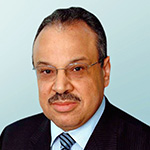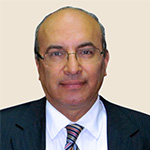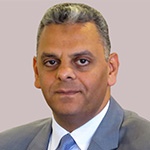Better cooperation among regional industry bodies necessary
The opportunities and challenges the insurance industry faces in Asia and Africa are largely similar in many aspects. Also, considering the social and geopolitical similarities, it is necessary for regional insurance bodies to collaborate to help providers benefit from the resources in the Afro-Asian markets while serving their national economies.
By Osama Noor
Several insurance and reinsurance providers are members of the three largest regional (re)insurance bodies – African Insurance Organisation (AIO), Federation of Afro-Asian Insurers & Reinsurers (FAIR) and General Arab Insurance Federation (GAIF). Members of these three bodies from emerging countries have in common many issues or challenges that need to be addressed jointly to benefit from the available resources in their corresponding regions, said GAIF secretary general Chakib Abouzaid.

Two such issues are dealing with the widening protection gap and climate change, said Mr Abouzaid. “Our main focus should be on how to close the protection gap, and forecast and mitigate the consequences of climate change. Therefore, the three organisations should initiate collaboration in these areas. For example, Turkey and Algeria have excellent experiences in managing Nat CATs; Morocco has a drought scheme; and Ethiopia has also started a drought scheme. Nevertheless, many countries are not yet prepared for the Nat CAT challenge and/or to reduce the protection gap. Exchanging experiences and creating capacities (pools) will definitely be an excellent way to enhance cooperation between African, Arab and Asian countries.”
The relatively low retention level due to small capital base and/or lack of technical expertise in some lines of business is another major challenge, said Mr Abouzaid. “Increasing regional capacities will increase the local retentions, especially with the implementation of the new solvency regulations.”

FAIR secretary general Dr Adel Mounir said his organisation offers a success story in the field of creating pools for members to ensure the protection of interests and the generation of profits. “The FAIR pools and syndicate have been developing over the years, whether in terms of the size of income generated or the nature of their structure. An example is the energy syndicate, which has become the first of its kind to gain a rating, thereby expanding its range of business to new markets.”
Integrating local reinsurance capacity
Reinsurance is a global business by definition; however, all (the emerging) markets are heavily relying on international markets, said Mr Abouzaid. “Even regional hubs like Singapore or the DIFC are channelling premiums to the head offices in London or continental Europe. More cooperation between Afro-Asian companies could create substantial capacity, but it is more important to improve the regional expertise for the highly technical lines of business and/or mega risks. This is not a new need; it was expressed more than 30 years ago by the United Nations Conference on Trade and Development (UNCTAD); but until now, with all due respect to our regional reinsurers, we have not been able to fill the gap.”
Increasing insurance penetration and density
Insurance penetration and density reflect the level of a country’s development, said Mr Abouzaid. In some member countries, the penetration remains below 1% and the density does not exceed $50. He added that the level of penetration and density are increasing in other countries because of compulsory insurance. “Initiatives such as microinsurance (in India, Sri Lanka, Indonesia) and takaful are bringing new populations to insurance. Using ‘top-up’ cards for medical or linking insurance to fertiliser suppliers for farmers (in Kenya) are also possible ways to improve the penetration. Our markets should seriously consider implementing such initiatives to promote insurance; and this is the role of our three organisations,” he said.
Investing in education
FAIR is in the process of launching its FAIR online academy to enhance the human capacity in the region. “Pooling knowledge from several regions would definitely enrich the accumulation of experiences. We have started thinking of cooperating with regional bodies to hold joint seminars which address common issues facing the Afro-Asian providers. Aside from the exposure participants will gain, holding joint events will build stronger bonds of cooperation and open the door to a wider exchange of business,” said Dr Mounir.
Mr Abouzaid said while there are educational institutions with excellent curricula and reputation in countries such as Singapore, India, Malaysia, Lebanon, Tunisia, Algeria Morocco, Egypt and South Africa, “in other countries, especially the GCC countries, we lack skilled local talent. Therefore, a regional education exchange platform could be a good initiative to group educational institutions in the Afro-Asian zone. Investing in education is key; our three organisations should make this their credo.”

There are many ways these organisations can collaborate to address untapped insurance potential, said Insurance Federation of Egypt chairman Alaa El-Zoheiry. “The starting point could be a meeting of all three bodies to figure out the right track of cooperation. This could only happen if the responsible leaders of these organisations really have the will to do so.”
Looking for a stronger role
Mr El-Zoheiry said, “Besides expanding GWP for their members, insurance and reinsurance organisations develop their insurance markets by providing knowledge, know-how, pooling and capacity building, unifying policies, problem-solving among the members and providing collectively statistics of the different members and countries.”
Though each organisation can do more for its members, collaborative efforts of these organisations have not been initiated. To kick things off, “each organisation could have its own technical committees to identify areas of cooperation, determine gaps that need to be filled, define an underwriting philosophy that can be adapted in these regions, enhance members’ bottom lines, and finally find topics that can be discussed during the different conferences held by these organisations”.